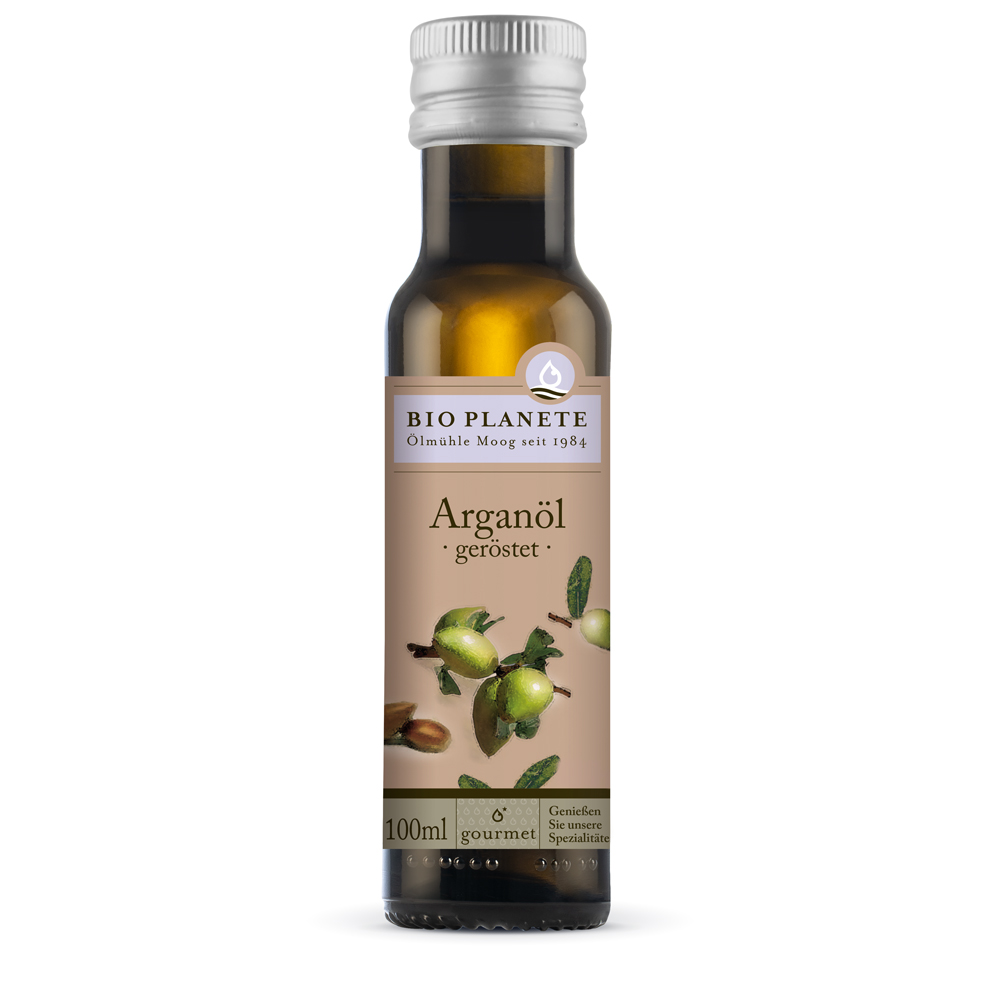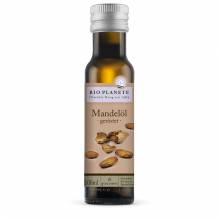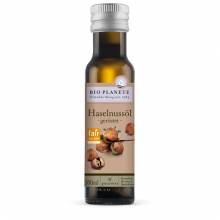Argan Oil
· Toasted ·
100 ml
BIO PLANÈTE Toasted Argan Oil comes from the Essaouira-Agadir region in the southwest of Morocco. Through joint commitment with our trading partner and a partnership of equals, we have been able to support the traditional crafts of the local Berber women and secure permanent jobs for the local people.
The yellow, olive-like argan fruits fall to the ground when ripe and are picked up by hand. 35 kg of fruit are needed for the production of one litre of Argan Oil. The dried and peeled argan fruits are then painstakingly broken open by hand by the Berber women to extract the oily almonds they contain. Still on site, these almonds are gently roasted and cold pressed.
Recipe ideas and use of Toasted Argan Oil
Toasted Argan Oil has a slightly nutty flavour with a wonderful roasted aroma. The oil is a real treasure in the gourmet kitchen. It not only adds an individual touch to oriental dishes such as tajine, a North African stew, couscous or the Berber breakfast, but is also suitable for refining meat, vegetables and desserts. Toasted Argan Oil may not be heated.
You can also try our Virgin Argan Oil, Toasted Almond Oil or the Shea Butter.
Product of organic farming
Average nutritional analysis for 100 ml
** % of daily reference intake (adults)
-
What conditions and standards are behind the organic seal on our oils?
An organic seal is a quality and test seal with which products from organic farming are marked. In 2010, a binding new organic seal was introduced throughout the EU, also known as the EU organic logo, which identifies food from organic farming (a star-shaped leaf on a green background).
This seal replaced the German state organic seal (green hexagon with "BIO" lettering), which had existed since 2001, with the same standards in terms of content. Due to the high degree of popularity of its predecessor, both seals are still often used today.
The use of this certification is strictly regulated by the publisher and is subject to ecological requirements. Compliance with the criteria by producers is ensured by a documentation obligation as well as regular sampling and examination of product samples. Compliance with the regulations is monitored in Europe by the responsible Eco-Control bodies.
Foods labelled with the organic seal must, among other things:
• Not be produced by or with/from genetically modified organisms
• Not to be produced with the use of synthetic pesticides
• Contain no more than 5% conventionally produced components (in exceptional cases, if ingredients are not available in ecological quality, in accordance with Annex VO)
• not contain sweeteners and stabilisers as well as synthetic colourants, preservatives and flavour enhancers
• not result from monotonous crop rotations (two-, three- and four-field farming)
• and much more: more information on the EU Organic Label -
Can I use the oil even after the expiration date?
We can no longer guarantee the oil's perfect quality after its best before date.
In the interest of sustainability, however, we would like to point out the following: vegetable oils do not belong to the group of very sensitive foodstuffs and can usually still be consumed after the best-before date. This is especially true if the bottle is still sealed and it has been stored away from heat sources. Therefore, we recommend using your senses to test the oil before disposing of it. Oil that has been stored for too long can be easily recognized by smell and taste. If it tastes rancid or unusual (off), it should not be consumed. -
How do I remove the labels from the jars and bottles?
Since we use oil-soluble glue for the labels, the best way to remove the label from the coconut jars is with oil. Simply coat the label with oil, let it absorb overnight and peel off easily in the morning. However, if the label is already off and only the glue is on it, this method doesn't work as well. In this context, we have been told of positive experiences with orange oil cleaner, such as from AlmaWin or Sodasan. Another option is a hair dryer - because heat also loosens the label well.
Get more suggestions at Upcycling & Creative.






